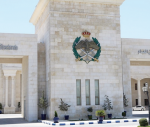You are here
Absence of the intellectual!
Feb 04,2023 - Last updated at Feb 04,2023
It seems certain that the intellectual has been absent from the arena for some time now, especially in the Arab and national arenas. And this is both sad and a big loss.
For decades, our intellectuals have had a strong presence, and they have impacted the scene quite substantially.
They contributed remarkably to knowledge transfer, to profound visions on matters, to elegant discourse on issues, and to broadmindedness and wisdom in addressing challenges.
And all of this contributed to educating others, broadening their horizons, refining their conduct, and augmenting social stability and cohesion.
A society without intellectuals is one that suffers from acute short-sightedness and lack of a clear direction.
Unfortunately, one feels that the role of the intellectual has ebbed to the extent of absence these days, and that the arena is left to many who present self-serving positions, opinions that lack depth and reliability, and words that border on the trivial and the useless.
The reasons for such regression are manifold, and they need to be studied carefully.
One, and this is perhaps the most understandable, has to do with the fact that sources of knowledge have become more plentiful than at any other time before; and therefore many started going to these sources directly without the help of intellectuals, who themselves used to be a major source of knowledge.
Another is due to the exponential multiplication in means of information communication, even though many of these means are, alas, suspect and untrustworthy.
A third pertains to the dramatic increase in the number of speakers on issues, to the extent that one is no longer able to distinguish between those have something solid and valid to say, and those who are just babbling.
In this context, a noted world thinker once said when asked about the reason for his “absence” from the scene: “I am not absent; the problem is that there are too many philosophers in town.”
There are other reasons, of course.
Some might say that one of the reasons is attributable to the rise of specialists in the various disciplines in today’s world.
One hastens to reply, however, that this is not necessarily correct as the role of the intellectual and that of the specialist do not collide; they complement each other in fact. The specialist presents ideas within a specific discipline, or a limited number of related disciplines, whereas the intellectual presents ideas across disciplines.
In addition, unlike many specialists, the intellectual introduces ideas to general readers in ways that they can understand, appreciate, and employ meaningfully in their lives.
And our world, indeed, can accommodate both, and is large and complex enough to require the roles and functions of both the intellectual and the specialist.
Another important question: Is the absence of the intellectual a natural outcome of the irrelevance of his/her role today?
The answer is: No.
The role of the intellectual is still important, and even fundamental, today; no one can fill his/her shoes.
He/she is the one who possesses the profound vision, the sharp mind, and the effective and constructive means of communication.
The noted American author and philosopher Ralph Waldo Emerson describes the intellectual, in his famous essay “The American Scholar” in these words: “The office of the scholar is to cheer, to raise, and guide men by showing them facts amidst appearances... He and he only knows the world.”
Similarly, Edward Said, in his book “Representations of the Intellectual”, asserts that the intellectual has a “specific role in society: He or she is endowed with a faculty for representing, embodying, articulating a message, a view, an attitude, etc. to/for a public; that he or she does so on the basis of universal principles”.
The voice of intellectuals is of vital importance these days, and it is incumbent upon all of our Arab societies, indeed all of humanity, to resuscitate and revitalise their role so that they will be able to resume conveying their positive and constructive messages, especially at a time when much of the information relayed to us is often suspect, ill-intended, or utterly fallacious.
The first, and perhaps most important, step in this direction would be to ensure a suitable and trustworthy venue of communication through which intellectuals can air their views and affirm their present positions on matters, so that their unique voices will not be lost in an ocean of white noise.













